Theories of Trade, Factor Mobility, and LUKOIL's Export Strategy
VerifiedAdded on 2023/01/04
|8
|1252
|80
Report
AI Summary
This report examines cross-cultural management theories in the context of Russia's position as an oil exporter, focusing on the application of mercantilism. It explores the impact of political and economic conditions on global oil markets and prices, including supply, demand, regulations, taxes, and competition. The report discusses the validity of the statement regarding competitive advantages in international trade and analyzes the relationship between factor mobility (land, labor, capital) and exports, specifically in the context of LUKOIL. The analysis highlights how these factors influence the company's international trade decisions and overall success. The report concludes with a list of references for further reading.
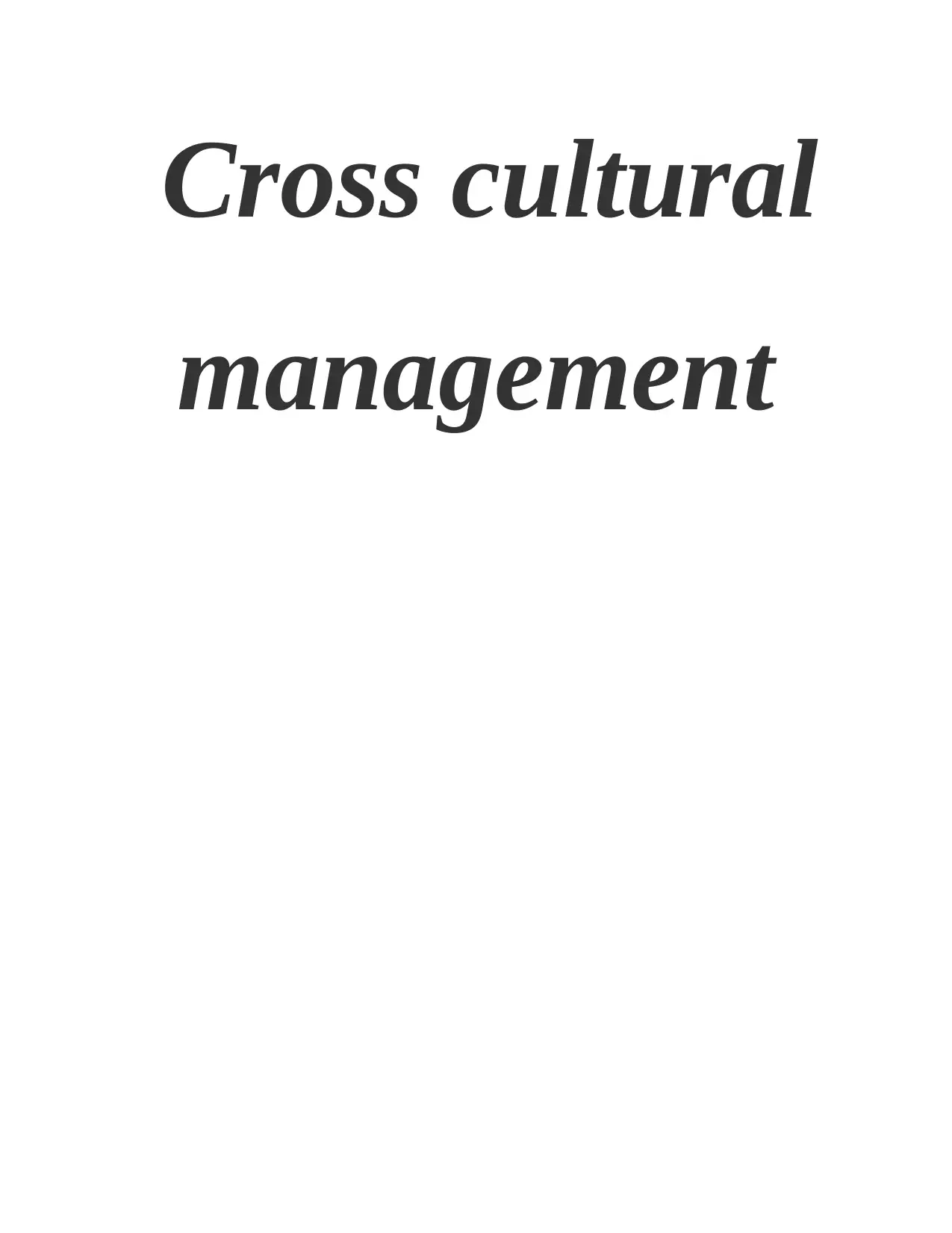
Cross cultural
management
management
Paraphrase This Document
Need a fresh take? Get an instant paraphrase of this document with our AI Paraphraser
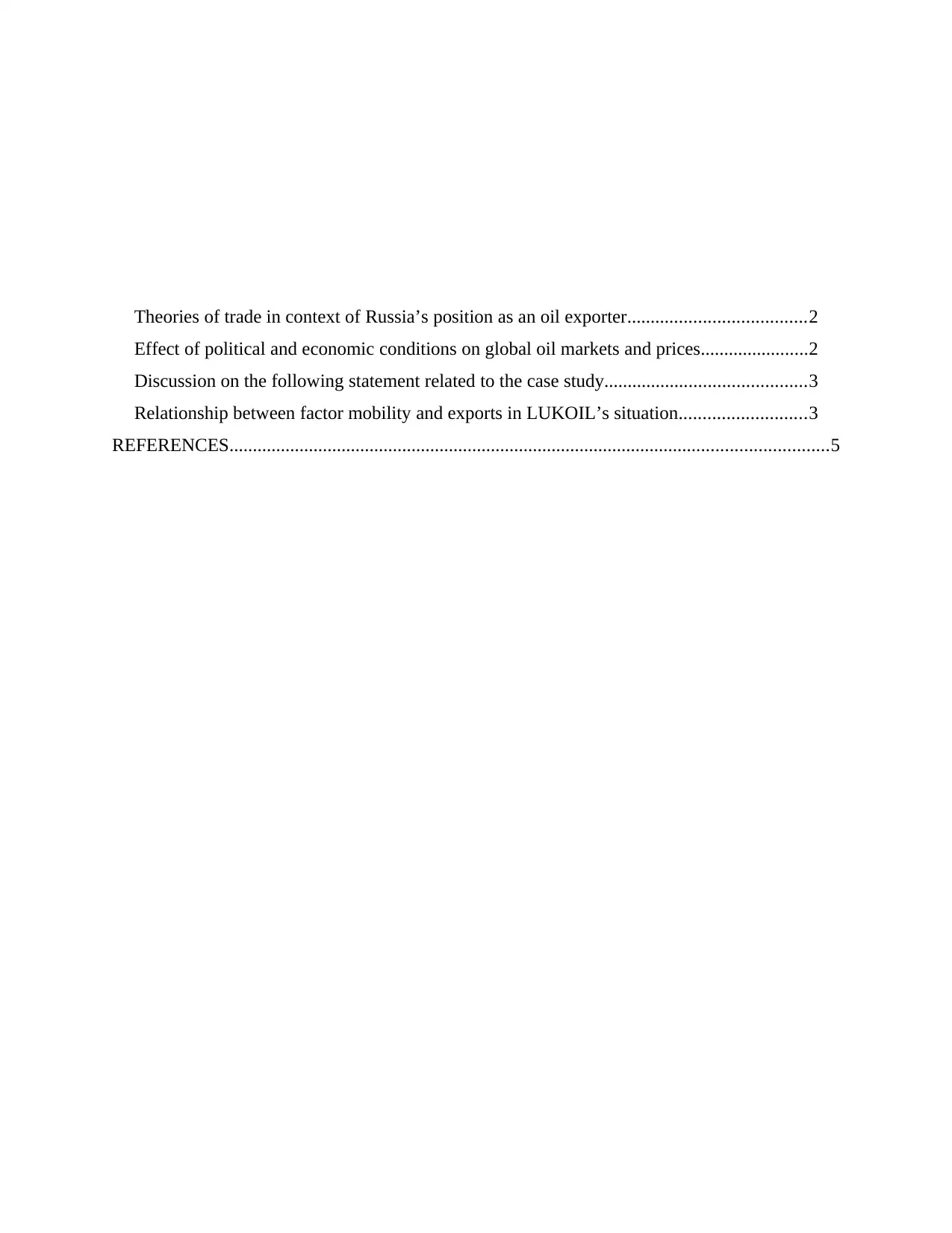
Theories of trade in context of Russia’s position as an oil exporter......................................2
Effect of political and economic conditions on global oil markets and prices.......................2
Discussion on the following statement related to the case study...........................................3
Relationship between factor mobility and exports in LUKOIL’s situation...........................3
REFERENCES................................................................................................................................5
Effect of political and economic conditions on global oil markets and prices.......................2
Discussion on the following statement related to the case study...........................................3
Relationship between factor mobility and exports in LUKOIL’s situation...........................3
REFERENCES................................................................................................................................5

⊘ This is a preview!⊘
Do you want full access?
Subscribe today to unlock all pages.

Trusted by 1+ million students worldwide

1
Paraphrase This Document
Need a fresh take? Get an instant paraphrase of this document with our AI Paraphraser
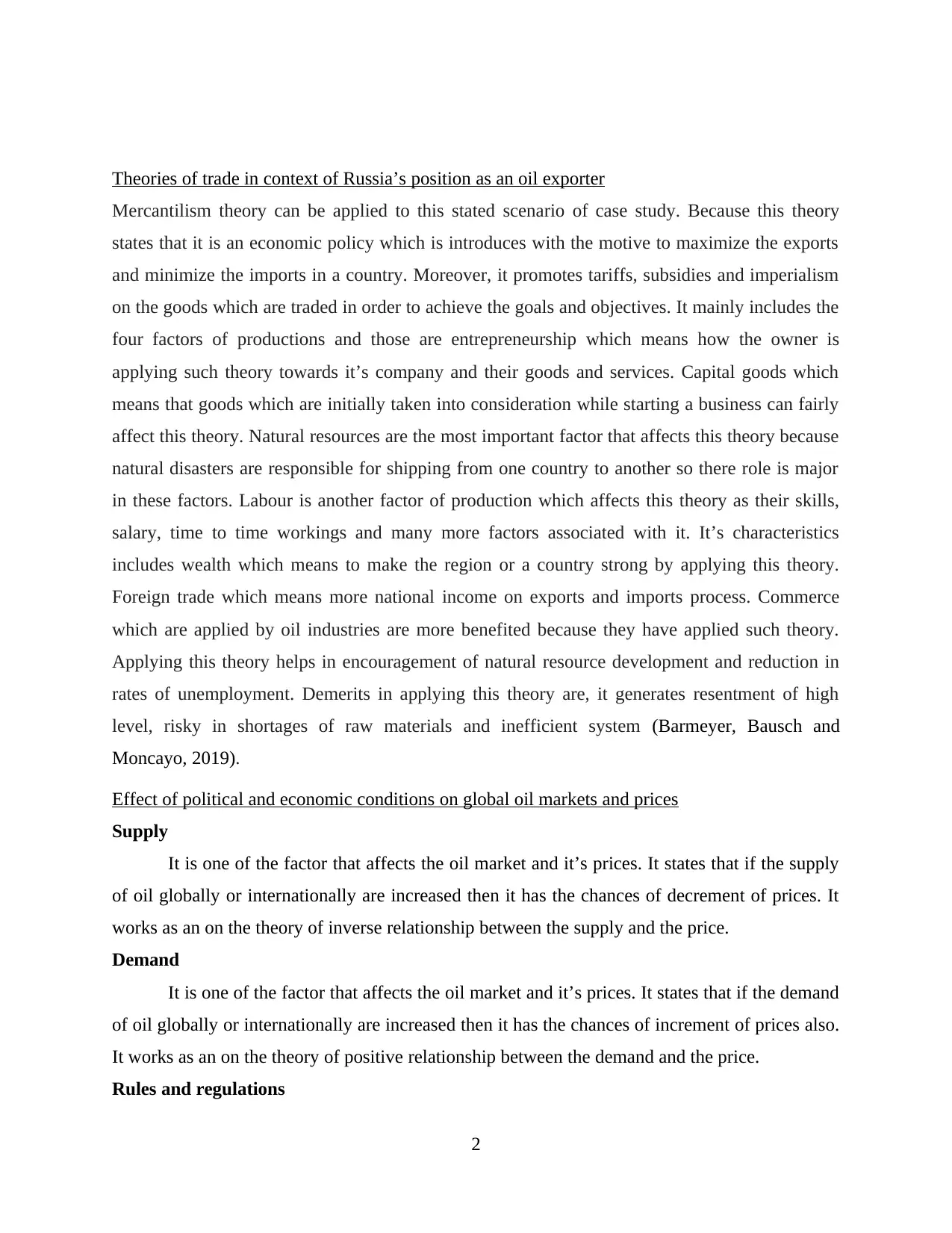
Theories of trade in context of Russia’s position as an oil exporter
Mercantilism theory can be applied to this stated scenario of case study. Because this theory
states that it is an economic policy which is introduces with the motive to maximize the exports
and minimize the imports in a country. Moreover, it promotes tariffs, subsidies and imperialism
on the goods which are traded in order to achieve the goals and objectives. It mainly includes the
four factors of productions and those are entrepreneurship which means how the owner is
applying such theory towards it’s company and their goods and services. Capital goods which
means that goods which are initially taken into consideration while starting a business can fairly
affect this theory. Natural resources are the most important factor that affects this theory because
natural disasters are responsible for shipping from one country to another so there role is major
in these factors. Labour is another factor of production which affects this theory as their skills,
salary, time to time workings and many more factors associated with it. It’s characteristics
includes wealth which means to make the region or a country strong by applying this theory.
Foreign trade which means more national income on exports and imports process. Commerce
which are applied by oil industries are more benefited because they have applied such theory.
Applying this theory helps in encouragement of natural resource development and reduction in
rates of unemployment. Demerits in applying this theory are, it generates resentment of high
level, risky in shortages of raw materials and inefficient system (Barmeyer, Bausch and
Moncayo, 2019).
Effect of political and economic conditions on global oil markets and prices
Supply
It is one of the factor that affects the oil market and it’s prices. It states that if the supply
of oil globally or internationally are increased then it has the chances of decrement of prices. It
works as an on the theory of inverse relationship between the supply and the price.
Demand
It is one of the factor that affects the oil market and it’s prices. It states that if the demand
of oil globally or internationally are increased then it has the chances of increment of prices also.
It works as an on the theory of positive relationship between the demand and the price.
Rules and regulations
2
Mercantilism theory can be applied to this stated scenario of case study. Because this theory
states that it is an economic policy which is introduces with the motive to maximize the exports
and minimize the imports in a country. Moreover, it promotes tariffs, subsidies and imperialism
on the goods which are traded in order to achieve the goals and objectives. It mainly includes the
four factors of productions and those are entrepreneurship which means how the owner is
applying such theory towards it’s company and their goods and services. Capital goods which
means that goods which are initially taken into consideration while starting a business can fairly
affect this theory. Natural resources are the most important factor that affects this theory because
natural disasters are responsible for shipping from one country to another so there role is major
in these factors. Labour is another factor of production which affects this theory as their skills,
salary, time to time workings and many more factors associated with it. It’s characteristics
includes wealth which means to make the region or a country strong by applying this theory.
Foreign trade which means more national income on exports and imports process. Commerce
which are applied by oil industries are more benefited because they have applied such theory.
Applying this theory helps in encouragement of natural resource development and reduction in
rates of unemployment. Demerits in applying this theory are, it generates resentment of high
level, risky in shortages of raw materials and inefficient system (Barmeyer, Bausch and
Moncayo, 2019).
Effect of political and economic conditions on global oil markets and prices
Supply
It is one of the factor that affects the oil market and it’s prices. It states that if the supply
of oil globally or internationally are increased then it has the chances of decrement of prices. It
works as an on the theory of inverse relationship between the supply and the price.
Demand
It is one of the factor that affects the oil market and it’s prices. It states that if the demand
of oil globally or internationally are increased then it has the chances of increment of prices also.
It works as an on the theory of positive relationship between the demand and the price.
Rules and regulations
2
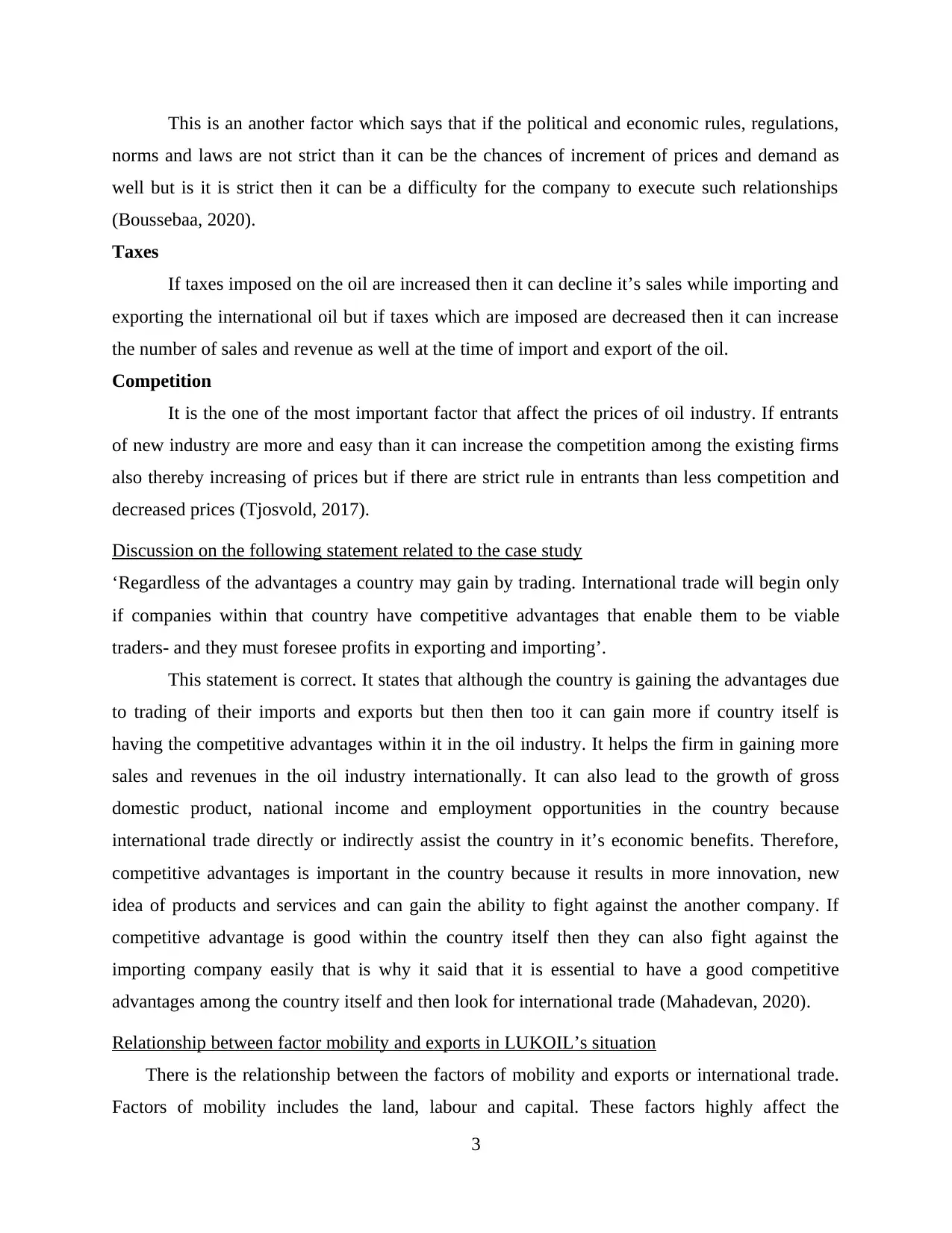
This is an another factor which says that if the political and economic rules, regulations,
norms and laws are not strict than it can be the chances of increment of prices and demand as
well but is it is strict then it can be a difficulty for the company to execute such relationships
(Boussebaa, 2020).
Taxes
If taxes imposed on the oil are increased then it can decline it’s sales while importing and
exporting the international oil but if taxes which are imposed are decreased then it can increase
the number of sales and revenue as well at the time of import and export of the oil.
Competition
It is the one of the most important factor that affect the prices of oil industry. If entrants
of new industry are more and easy than it can increase the competition among the existing firms
also thereby increasing of prices but if there are strict rule in entrants than less competition and
decreased prices (Tjosvold, 2017).
Discussion on the following statement related to the case study
‘Regardless of the advantages a country may gain by trading. International trade will begin only
if companies within that country have competitive advantages that enable them to be viable
traders- and they must foresee profits in exporting and importing’.
This statement is correct. It states that although the country is gaining the advantages due
to trading of their imports and exports but then then too it can gain more if country itself is
having the competitive advantages within it in the oil industry. It helps the firm in gaining more
sales and revenues in the oil industry internationally. It can also lead to the growth of gross
domestic product, national income and employment opportunities in the country because
international trade directly or indirectly assist the country in it’s economic benefits. Therefore,
competitive advantages is important in the country because it results in more innovation, new
idea of products and services and can gain the ability to fight against the another company. If
competitive advantage is good within the country itself then they can also fight against the
importing company easily that is why it said that it is essential to have a good competitive
advantages among the country itself and then look for international trade (Mahadevan, 2020).
Relationship between factor mobility and exports in LUKOIL’s situation
There is the relationship between the factors of mobility and exports or international trade.
Factors of mobility includes the land, labour and capital. These factors highly affect the
3
norms and laws are not strict than it can be the chances of increment of prices and demand as
well but is it is strict then it can be a difficulty for the company to execute such relationships
(Boussebaa, 2020).
Taxes
If taxes imposed on the oil are increased then it can decline it’s sales while importing and
exporting the international oil but if taxes which are imposed are decreased then it can increase
the number of sales and revenue as well at the time of import and export of the oil.
Competition
It is the one of the most important factor that affect the prices of oil industry. If entrants
of new industry are more and easy than it can increase the competition among the existing firms
also thereby increasing of prices but if there are strict rule in entrants than less competition and
decreased prices (Tjosvold, 2017).
Discussion on the following statement related to the case study
‘Regardless of the advantages a country may gain by trading. International trade will begin only
if companies within that country have competitive advantages that enable them to be viable
traders- and they must foresee profits in exporting and importing’.
This statement is correct. It states that although the country is gaining the advantages due
to trading of their imports and exports but then then too it can gain more if country itself is
having the competitive advantages within it in the oil industry. It helps the firm in gaining more
sales and revenues in the oil industry internationally. It can also lead to the growth of gross
domestic product, national income and employment opportunities in the country because
international trade directly or indirectly assist the country in it’s economic benefits. Therefore,
competitive advantages is important in the country because it results in more innovation, new
idea of products and services and can gain the ability to fight against the another company. If
competitive advantage is good within the country itself then they can also fight against the
importing company easily that is why it said that it is essential to have a good competitive
advantages among the country itself and then look for international trade (Mahadevan, 2020).
Relationship between factor mobility and exports in LUKOIL’s situation
There is the relationship between the factors of mobility and exports or international trade.
Factors of mobility includes the land, labour and capital. These factors highly affect the
3
⊘ This is a preview!⊘
Do you want full access?
Subscribe today to unlock all pages.

Trusted by 1+ million students worldwide
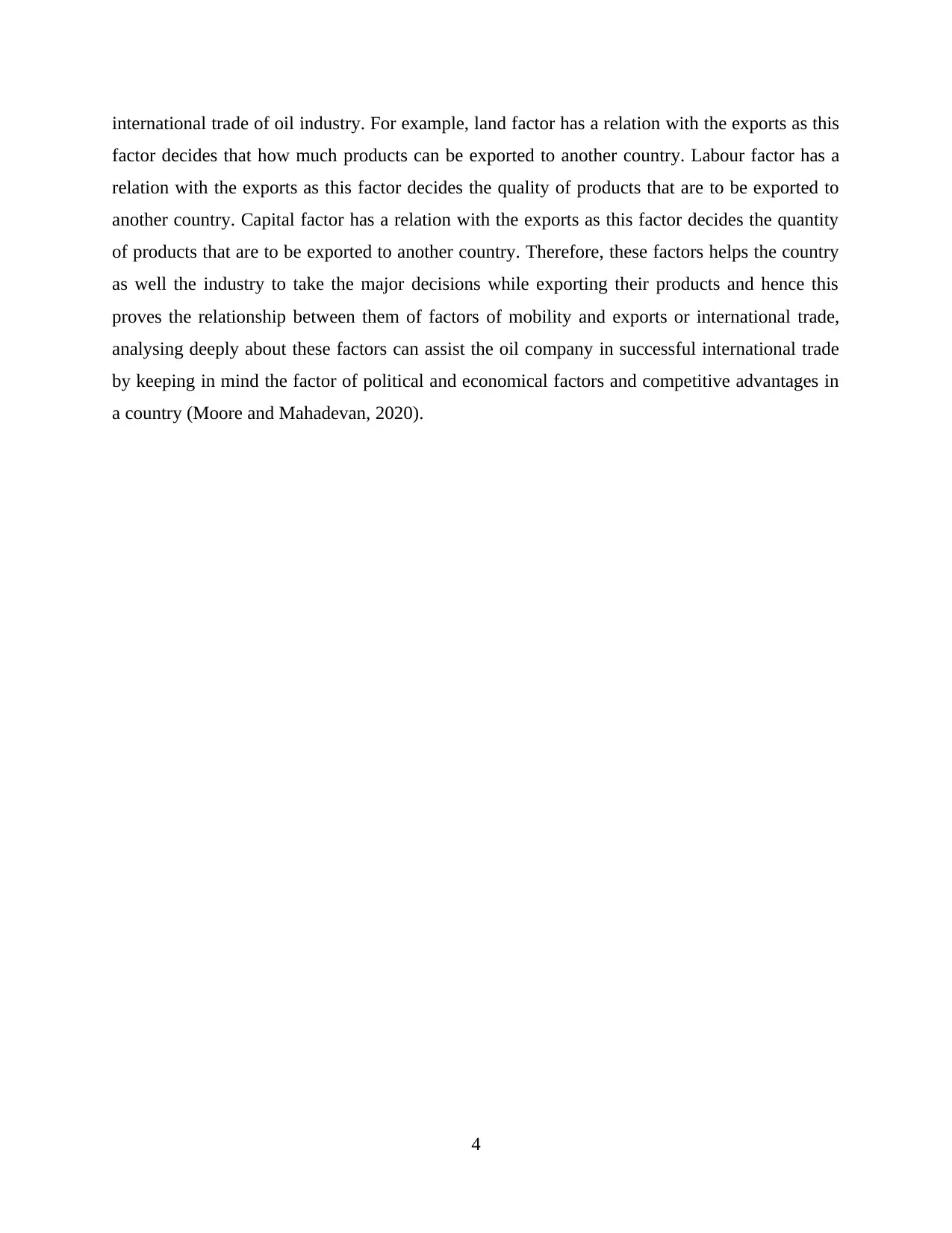
international trade of oil industry. For example, land factor has a relation with the exports as this
factor decides that how much products can be exported to another country. Labour factor has a
relation with the exports as this factor decides the quality of products that are to be exported to
another country. Capital factor has a relation with the exports as this factor decides the quantity
of products that are to be exported to another country. Therefore, these factors helps the country
as well the industry to take the major decisions while exporting their products and hence this
proves the relationship between them of factors of mobility and exports or international trade,
analysing deeply about these factors can assist the oil company in successful international trade
by keeping in mind the factor of political and economical factors and competitive advantages in
a country (Moore and Mahadevan, 2020).
4
factor decides that how much products can be exported to another country. Labour factor has a
relation with the exports as this factor decides the quality of products that are to be exported to
another country. Capital factor has a relation with the exports as this factor decides the quantity
of products that are to be exported to another country. Therefore, these factors helps the country
as well the industry to take the major decisions while exporting their products and hence this
proves the relationship between them of factors of mobility and exports or international trade,
analysing deeply about these factors can assist the oil company in successful international trade
by keeping in mind the factor of political and economical factors and competitive advantages in
a country (Moore and Mahadevan, 2020).
4
Paraphrase This Document
Need a fresh take? Get an instant paraphrase of this document with our AI Paraphraser
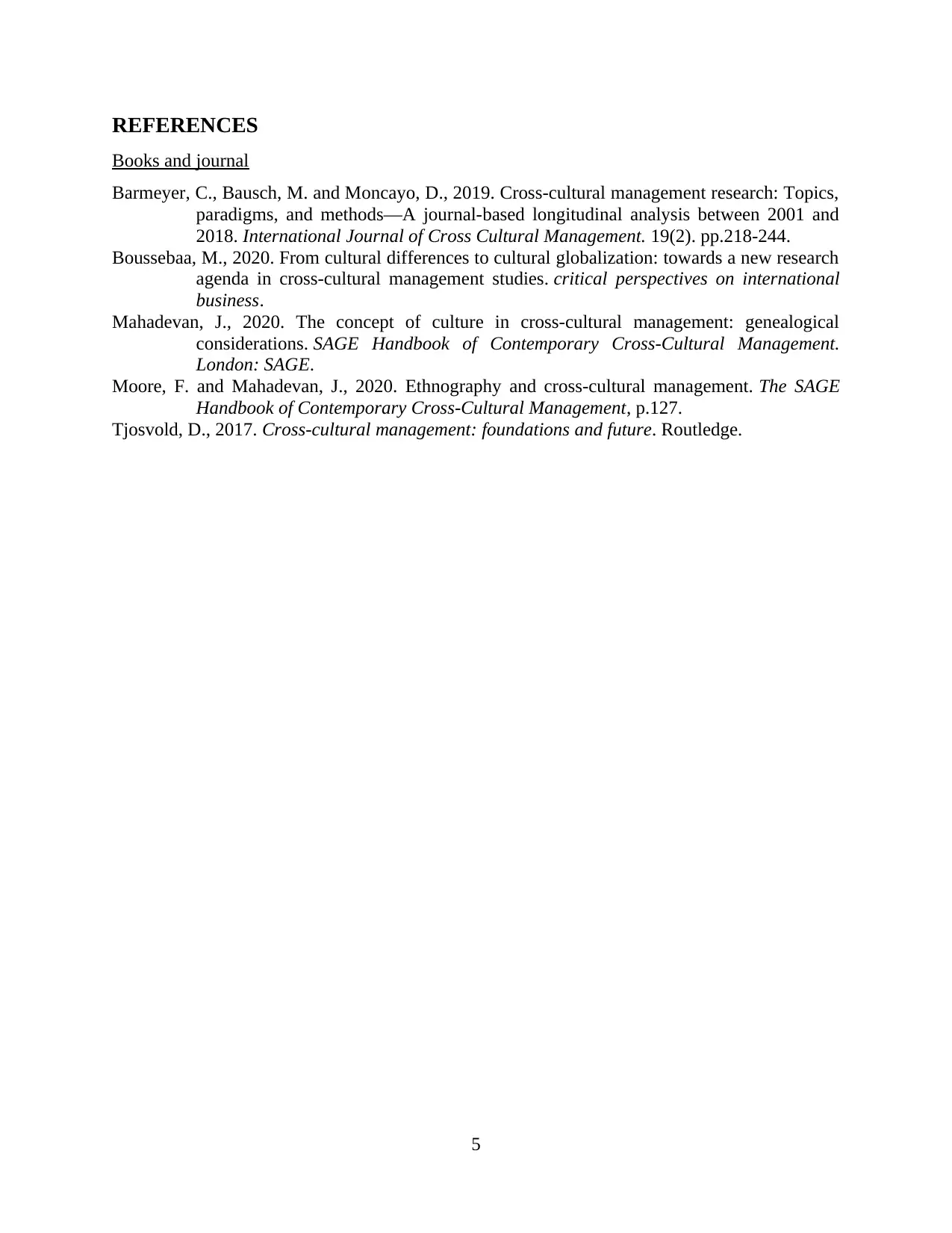
REFERENCES
Books and journal
Barmeyer, C., Bausch, M. and Moncayo, D., 2019. Cross-cultural management research: Topics,
paradigms, and methods—A journal-based longitudinal analysis between 2001 and
2018. International Journal of Cross Cultural Management. 19(2). pp.218-244.
Boussebaa, M., 2020. From cultural differences to cultural globalization: towards a new research
agenda in cross-cultural management studies. critical perspectives on international
business.
Mahadevan, J., 2020. The concept of culture in cross-cultural management: genealogical
considerations. SAGE Handbook of Contemporary Cross-Cultural Management.
London: SAGE.
Moore, F. and Mahadevan, J., 2020. Ethnography and cross-cultural management. The SAGE
Handbook of Contemporary Cross-Cultural Management, p.127.
Tjosvold, D., 2017. Cross-cultural management: foundations and future. Routledge.
5
Books and journal
Barmeyer, C., Bausch, M. and Moncayo, D., 2019. Cross-cultural management research: Topics,
paradigms, and methods—A journal-based longitudinal analysis between 2001 and
2018. International Journal of Cross Cultural Management. 19(2). pp.218-244.
Boussebaa, M., 2020. From cultural differences to cultural globalization: towards a new research
agenda in cross-cultural management studies. critical perspectives on international
business.
Mahadevan, J., 2020. The concept of culture in cross-cultural management: genealogical
considerations. SAGE Handbook of Contemporary Cross-Cultural Management.
London: SAGE.
Moore, F. and Mahadevan, J., 2020. Ethnography and cross-cultural management. The SAGE
Handbook of Contemporary Cross-Cultural Management, p.127.
Tjosvold, D., 2017. Cross-cultural management: foundations and future. Routledge.
5
1 out of 8
Related Documents
Your All-in-One AI-Powered Toolkit for Academic Success.
+13062052269
info@desklib.com
Available 24*7 on WhatsApp / Email
![[object Object]](/_next/static/media/star-bottom.7253800d.svg)
Unlock your academic potential
Copyright © 2020–2026 A2Z Services. All Rights Reserved. Developed and managed by ZUCOL.





